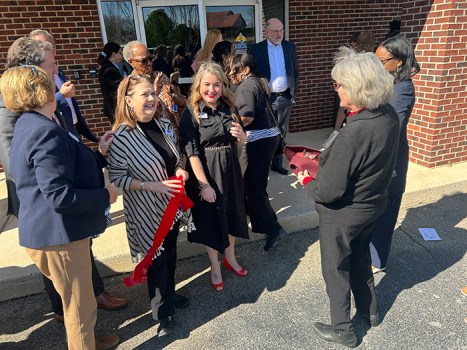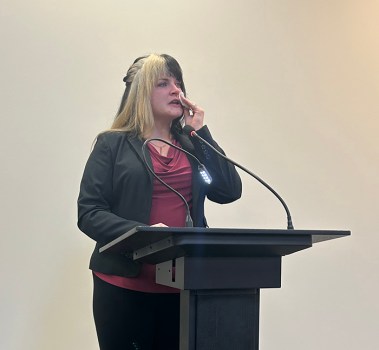Help and hope: Behavioral Health Urgent Care extends aid to struggling Rowan Countians
Published 12:10 am Thursday, March 27, 2025
SALISBURY — Before Wednesday, those suffering from mental health conditions likely struggled to find resources in Rowan County, but with a new clinic opening, that help will be available 24/7.
The Behavioral Health Urgent Care (BHUC), located in Daymark Recovery Services’ current building on Statesville Boulevard beside the Rowan Community Center, represents the work of several partners — Rowan County United Way, Vaya Health, the Rowan County Health Department, Novant Health, Daymark Recovery Services and others — to bring around-the-clock behavioral health treatment to Rowan County.
Numerous local officials and community stakeholders were on site Wednesday morning for a celebration of the ribbon cutting ceremony at the newly-minted clinic. Wednesday’s speakers emphasized the importance of addressing mental health conditions similarly to physical ailments, adding appreciation for Rowan County’s support and the role of various organizations, including Daymark, Vaya Health, and the United Way in making the day a reality.
“We would never tell someone with a broken leg that they should stop wallowing and get it together,” said David Whisenant, quoting former First Lady Michelle Obama. “We don’t consider taking medication for an ear infection something to be ashamed of. We shouldn’t treat mental health conditions any differently.”
Dispelling notions of stigma that surround mental health and substance abuse disorders harkens to the core of what BHUC aims to do. In sharing their personal testimonies, three of Wednesday’s speakers highlighted just how indiscriminate mental health can be and how far its broad-reaching and negative impacts can go.
Rowan County United Way Executive Director Jenny Lee provided a glimpse into how far mental health creeped into her life and how its shadow still looms.
“We ask folks to come out that have been service recipients of our programs, to be vulnerable and share their stories, to give hope and help folks understand what services are available to our community and what their hard-working dollars go towards,” she said. “Every year, we ask folks to be strong (and) let down their guard … I would like to do that for the first time ever here with you all today.”
In 2018, having recently been hired to lead United Way, Lee was adjusting to life. She and Royce, the father of her two girls, had separated, so life was looking a little different than she had planned, but she was excited about her new role. In that newfound capacity, she was slated to present some data on the community health needs assessment
“I was prepared,” Lee said. “I was excited. I had all my notes ready, all the materials, packed away in my vehicle. At four o’clock on Dec. 17, I got the call that no one ever wants to get, and that is the father of my two daughters, my best friend and the once love of my life had died earlier that day.”
As if processing that trauma was not hard enough, Lee said she immediately converted to a damage control mindset.
“Stigma is tough,” she said. “I was the new director. I thought about, well, let’s give him a heart attack. Let’s not tell the truth, you know. But then I thought, what good is this going to do?”
The very data that she was set to present indicated that mental health and substance abuse were the top two health conditions needing the most prioritization within the community.
Lee acknowledged that time alone has not healed her wounds, but the work she’s done during that time has.
“I have found though over time and sharing this story, I have healed,” she said. “I have become a better mother. I’ve learned to learn more about the disease and to stop being angry with the man for not choosing me, not choosing (our daughters) Hazel and Stevie. I’ve learned the disease and I tried to process it over time and after a year of working through this and in learning more about behavioral health issues, it all started to help me heal and become the better part of me that this community deserved.”
Coming to her personal terms resulted in some profound realizations.
“We all have demons, and we all have secrets, some of which we can mend, some of which we are able to carry out our entire lives and never let anyone know,” she said. “Some run so deep that they take every ounce of good and what is normal human nature away from us.”
Lee said that Royce made numerous unsuccessful attempts to tackle his addictions.
“He gave it a good, hard fight to become the father that he knew our daughters deserved but the disease that we all commonly know as addiction prevailed,” she said. “I share this all with you today because I don’t want you to feel sorry for me, not one bit. But I share with you because Royce was a man. He was smart, he was caring, he was a talented person. He was a son, a brother, a father and the person I once thought I would spend the rest of my life with, but this man that anyone could absolutely fall in love with from the moment that you met them, lost his 32 short years of life to something that is so dark that at times, has a power stronger than faith itself.”
Lee opted for honesty on Wednesday.
“I want to share with you that from that moment that I made a commitment to our board of directors, that I would fight every single day to make sure that we had resources available so that children would not grow up fatherless, so that parents would not grow up without their children, so that partners would not grow up and share their lives without their partner,” she said.
Along with Lee, Rowan County Commissioner Judy Klusman has been a huge part of bringing the BHUC to fruition, having worked on its committee since the beginning. She also serves as the commissioners’ liaison to the county’s health board. She has also suffered from her own mental health conditions since before she was a teenager.
“My mental health issues started when I was 12 years old,” Klusman said. “I would sit at my desk at school and tap my pencil until my teacher said, stop. At 15, I had two separate times I couldn’t get out of bed for two weeks each. I was exhausted.”
Her mother thought she had mono. A doctor disagreed. They resolved that she would be better soon and Klusman just accepted her state as normal.
“So I turned 18, and off to college I went,” she said. “I was extremely depressed and homesick, but I didn’t know what it was, and neither did my roommate. For me, it was just normal. At 22, I got married. And still had bouts of depression and anxiety. I still didn’t know what it was. For me, it was just normal. At 24, my first child arrived, and I should have been so happy, but many days I wasn’t. After he was born, my sadness was much worse. I couldn’t get out of bed. I still didn’t know it was postpartum depression, on top of my depression and other things going on in my brain.”
Klusman continued on with life, but still struggled with the battle going on inside her head.
“All 38 years of being sad and anxious and falling asleep all the time not being able to get out of bed, but then a friend connected me with a wonderful psychiatrist and counselor, and then I learned it was not normal,” Klusman said. “It was severe depression, bipolar, anxiety, panic attacks, ADHD, stress and a few other things.”
At long last, she knew what it was.
“It had a name, mental illness, and medication helped a lot,” Klusman said. “I was more productive. I could control my angry outbursts. I got out of bed and felt refreshed. Over the years, there have been many setbacks, but I just kept working with my doctor and my counselor.”
Klusman indicated that along with the medication has come a certain reckoning.
“I can stand before you today as someone who has an illness of the brain,” Klusman said. “It’s called mental illness. Mental illness is what I have. It’s not who I am. And that’s the same for everyone who has mental illness or substance use disorder, it’s what we have, just like diabetes, it’s not who we are, it’s an illness in our brain, and there is help and hope.”
Personal substance abuse
Dystanie Richard is a certified peer support specialist and resident services coordinator for Capstone Recovery. She has dedicated her life to helping others in their own recovery after having lived through a dark period herself.
“I have been fighting back tears since I woke up at 7:30 a.m. as someone from this community that has not only recovered but destroyed it before I recovered,” Richard said on Wednesday. “This is a really big deal. This is a huge deal. This is history in the making, because there’s going to be people whose lives are saved.”
Richard is a two-time felon.
“I served three years in prison behind drug-related charges that hurt people given the police department more than their work is cut out,” she said. “That’s who I was.”
Thankfully, those days are in the rearview mirror for Richard, but she knows that the battle has not been won for many.
“When I decided to get better and then I knew that I could actually be better and continue a life that’s better than the one I’ve been living since I was a young teenager, I dedicated my life to recovery,” she said.
Looking at the services that will now be available to people struggling make Richard wonder what if.
“If younger me would have had this, who knows how much sooner you would have gotten better,” Richard said of the BHUC. “You know, addiction is just the surface of something bigger … this is not only going to address substance use disorder, so I’m also going to address the mental health aspect of it. That’s what matters. Because all it took was one person believing in me that I wasn’t who I thought I was.”
A special thanks
In addition to Lee and Klusman, members of the Behavioral Health Advisory Committee were Novant Health Rowan Medical Center’s Dr. Venkata Ravi Chivukula, United Way Board of Directors President Desiree Dunston, Rowan County Department of Social Services Director Micah Ennis from the Rowan County Department of Social Services, Rowan County Public Health Director Alyssa Harris, Vaya Health Regional Director of Community Relations Zack Shepherd and Vaya Health Director of Crisis Laurie Whitson.
Lee also offered a touching tribute to the recently deceased Melissa Robbins, who worked as the finance and operations director for Rowan County United Way for a quarter century.
“She is here in spirit with us, and without her conviction and unwavering support, we wouldn’t be here today,” Lee said.






